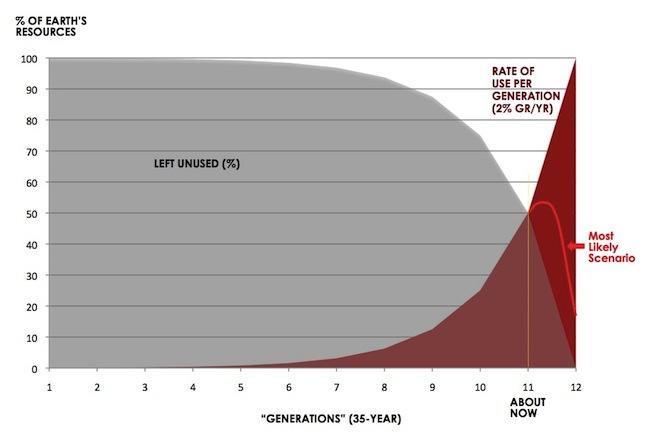Environment & Energy
Related: About this forumA blog recommendation, and a taste with flavour
I'd like to recommend the blog of Dave Pollard, called (with some small suspicion of irony) How To Save The World.
He's a fellow Canuck, almost exactly the same age as yours truly, and I just discovered him yesterday via Carolyn Baker's mailing list (also highly recommended).
Here's a sample of his work.
Imagine that each generation a spokesperson is selected by the human race to meet with Mother Nature and announce what the species needs for the next generation. For the first million years or so of human life on Earth this is a pleasant affair, since the demands in the first 30,000 meetings do not increase at all. Then, about 300 generations ago, the demands begin to increase by about 40% each generation (as human population increases by 1%/year). Mother Nature is not pleased, arguing that humans are taking more than their share, but she allows it to continue, even though it brings about the start of the sixth great extinction of life on Earth, and decimates the larger mammals that were essential players in many of the planet’s ecosystems.
Then, about 11 generations ago, the demands begin to increase by 100% each generation (as new industrial technologies enables human production and consumption to grow by 2% per year). As this industrial era begins, human population is growing by 3% per year, so even with production growing at 2% per year, this ushers in a period of unprecedented poverty and suffering. Even when population slows in the most recent generation to just 1% per year, there are already billions of struggling people demanding that production growth increase by more than population, so they can escape from poverty.
Mother Nature is exasperated. Because most humans now live in cities, disconnected from the natural world, they cannot appreciate why it is unreasonable for their species to consume the resources needed for other creatures and future generations. She shows the human representatives the folly of growth, using the chessboard story and the history of previous civilizations that tried to grow beyond their means, but generation after generation our representatives don’t believe these lessons apply to such an ingenious species as modern humans. As the industrial age advances, humans increasingly fight bloody and Earth-poisoning wars over resources, since the clumsy distribution systems humans have created fail to use these resources effectively or distribute them equitably.
Still, for 11 more generations, each human generation’s representative demands twice as much as the one before. Finally, Mother Nature has had enough. In 2012 she sits the representative down and confesses that there simply aren’t enough resources left to meet the demands for another human generation. In the generation just past, she says, humans have consumed a fourth of all the resources of the planet. Only half of the planet’s resources now remain, and the human representative is essentially asking for all of it. Even if I could give you that, she says, it would leave nothing for other creatures, and nothing for future generations.
The human is unconvinced. Looking around, there are lots of forests to be seen, lots of food growing, still plenty of fresh water in many places. The weather is usually pretty good and stable — no incontrovertible evidence of climate change. Human ingenuity is at work inventing new forms of renewable energy and food, and finding ways to extract energy that had been thought inaccessible. Human population is stabilizing, and within another generation it might even level off. What is the problem?

If that resonated with you, you might want to read this very trenchant piece: Why We Cannot Save the World
northoftheborder
(7,574 posts)CRH
(1,553 posts)Thank you.
phantom power
(25,966 posts)awesome
NoOneMan
(4,795 posts)There are definitely some stages of dealing with the end of civilization beyond despair and defiance.
This blog reminds me a bit of http://questioneverything.typepad.com/
GliderGuider
(21,088 posts)George Mobus of QuestionEverything is one of the more academic voices.
There's also:
Guy McPherson of Nature Bats Last;
Carolyn Baker;
Gail Tverberg;
The Collapse of Industrial Civilization;
Dmitry Orlov;
And my contribution, Approaching the Limits to Growth.
There are many more. People aren't dissing the doomers quite as much these days. A collapsing Europe, Peak Oil, the Japanese nuclear problem, a melting ice cap and world-wide droughts and rainstorms will do that. And more and more of us are writing about it...